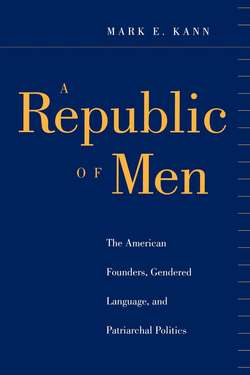Читать книгу A Republic of Men - Mark E. Kann - Страница 16
На сайте Литреса книга снята с продажи.
2
The Grammar of Manhood
ОглавлениеThe American founders coupled the concept of manhood to the language of liberty. Benjamin Franklin proclaimed that his grandfather’s essay on liberty was written with “manly freedom” and Thomas Paine explained that Common Sense was meant to prepare the way for “manly principles of independence.” John Adams praised his Puritan ancestors for their “manly assertion of. . . rights” and “manly pertinacious spirit” against tyranny while Thomas Jefferson applauded his American brethren for demonstrating “manly firmness” and “manly spirit” by renouncing British authority and declaring independent nationhood.1 Manhood modified liberty and thereby injected an element of masculine merit into the rhetoric of early American citizenship.
One reason the founders joined manhood to liberty was to motivate males to be warriors in the struggle against Great Britain. They delivered the message that men who trumpeted the glories of liberty and triumphed over its enemies merited the honor and respect due to manhood as well as the rights and responsibilities of citizenship. Thomas Paine and Abigail Adams sent a complementary message to men who opposed the patriot cause or did not join it. Paine wrote that any male who lent credence to Tory propaganda was “an apostate from the order of manhood.” Adams declared that men who did “not fight and defend their own particular spot. . . deserve the slavery and subjection which awaits them.”2 The unmistakable implication was that those men who failed to measure up to martial manhood were unworthy of liberty and citizenship.
A second reason the founders joined manhood and liberty was to promote an ethic of self-restraint. Patrick Henry applauded the “manly fortitude” that encouraged men to sacrifice popularity for moral integrity while James Otis, Jr., honored “manly sentiments” that enjoined men to sacrifice “health, ease, estate, or even life” for freedom. Paine gloried in the “manly and martial spirit” that disciplined soldiers and Benjamin Franklin cheered the “manly constancy” that kept men calm in the midst of hardship. George Washington called for “manly conduct” to transform demobilized soldiers into self-disciplined citizens and others pleaded for “manly reflection” to inhibit licentiousness, “manly graces” to cure conflict, “manly confidence” to bind citizens to officials, and “manly reverence” to foster obedience to the U.S. Constitution and its “manly government.”3 Men who engaged in licentious conduct and democratic excess deserved to be marginalized, stigmatized, ostracized, and even deprived of liberty, while those who exhibited manly self-restraint earned the freedom to practice responsible citizenship and promote the public good.
The founders promoted the idea that men should be enthusiastic in the cause of liberty but restrained in the exercise of liberty by elaborating a grammar of manhood. Their grammar drew on hegemonic norms of manhood to encourage disorderly men to conform to a standard of manly conduct conducive to individual self-restraint, good citizenship, and public order. Their grammar of manhood also articulated consensual criteria for sorting out the ranks of men, restoring order to them, and legitimizing leadership authority in the new republic. The founders’ main motivation for deploying the grammar of manhood was to encourage men to discipline democratic desire; a crucial consequence of their use of it was to develop and disseminate ideas of citizenship and leadership that precluded women from political participation.
